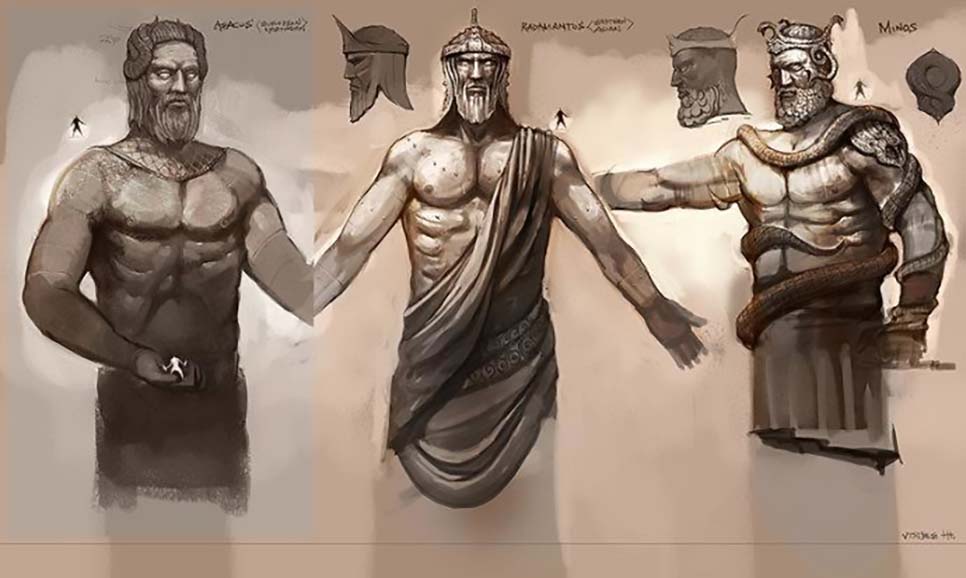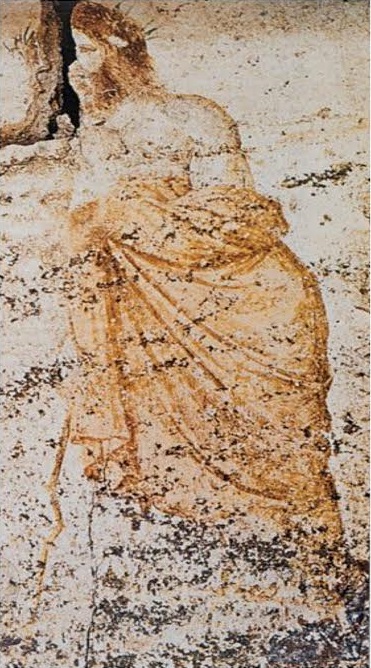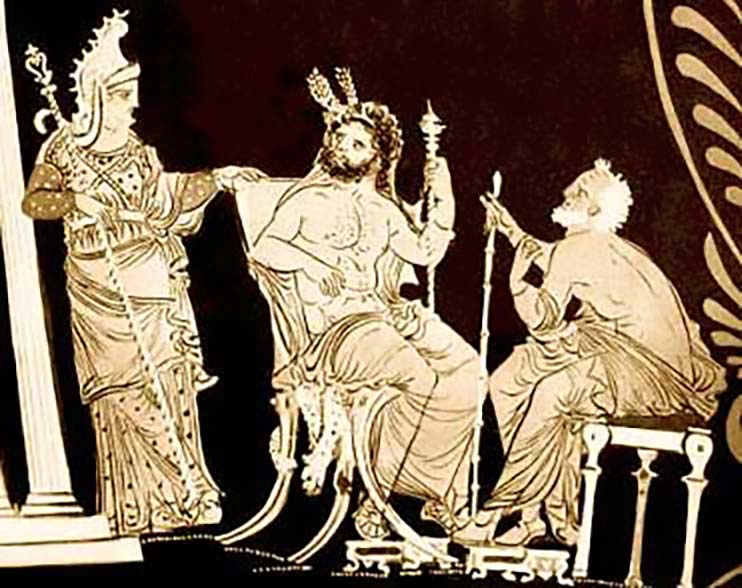Rhadamanthys
In Greek mythology, Rhadamanthus or Rhadamanthys (Ancient Greek: Ῥαδάμανθυς) was a wise king of Crete. In later accounts he is said to be one of the judges of the dead.
Rhadamanthys was the son of Europa, and so his story begins with the abduction of Europa by Zeus. In the form of a bull, Zeus would transport Europa to Crete, and on the island, beneath a cypress tree, the god would have his way with her. From the brief relationship three sons were born to Europa, Minos, Sarpedon and Rhadamanthys.
Zeus would leave his conquest on Crete, although Europa would soon wed Asterion, the king of Crete, and Europa’s new husband adopted her three sons as his own; and so Rhadamanthys grew up in the royal palace.
Eventually Asterion would pass away, and in the most popular version of the story, the three sons of Europa vied to become the new king of Crete, with Minos eventually winning out when Poseidon sent a magnificent bull as a sign of his favour.
In an alternate version of the tale though, there was no contest for succession to the Cretan throne, and Rhadamanthys was said to have succeeded his stepfather. Briefly, Rhadamanthys was king of Crete, and as well as introducing new laws,
Rhadamanthys was thought of as being a just king, and one that was popular with the people of Crete.
There is a reference to a law of Rhadamanthus ordering the Cretans to swear oaths by animals (Porphyry, De Abstinentia III.16.6) and to another law of Rhadamanthus saying if a person defends themselves against another who initiated violence then they should suffer no penalty (Apollodorus Library of Greek Mythology, II.4). Minos though was jealous of his brother and so usurped him.

In either version of the story, when Minos became king of Crete, he exiled his two brothers so that there should be no threat to his position. Sarpedon would travel to Lycia, whilst Rhadamanthys journeyed to Ocalea in Boeotia, where he established a new kingdom. As king of Ocalea, Rhadamanthys would govern in a fair and just way, and his advice was often sought out by others from across ancient Greece.
Some stories tell of how Rhadamanthys had already fathered two sons on Crete, possibly by his niece Ariadne. These two sons were Gortys, the eponymous founder of Gortyn on Crete, and Erythrus the Red, found of Erythrae in Asia Minor.
In Boeotia though, Rhadamanthys found a new wife, the widowed Alcmene. Alcmene was of course famed for being the mother of Heracles, and some ancient writers would claim that it was Rhadamanthys who taught his stepson how to notch and shoot the bow (this is also mentioned by Tzetzes, a medieval historian).
Rhadamanthys' story would continue even after death, for the fairness of his rule in Ocalea, resulted in him being appointed as one of the three judges of the dead in the afterlife, along with the other deceased kings, Aeacus and Minos.
In the realm of Hades, three judges would decide how the deceased would spend eternity. Aeacus was said to judge those from Europe, Rhadamanthys would judge those from the east, and Minos would have a deciding vote if there was a dispute.
Thus Rhadamanthys had the power to send someone to Tartarus (hell), the Asphodel Meadows (nothingness) or the Elysian Fields (paradise).
Some ancient writers would also tell of how Rhadamanthys was made Lord of Elysium (the Elysian Fields), and so Rhadamanthys would reside with the heroes and righteous of Greek mythology, the likes of Achilles and Cadmus.
Specifically, Homer represents him as dwelling in the Elysian Fields (Odyssey iv. 564), the paradise for the immortal sons of Zeus. Pindar says that he is the right-hand man of Cronus (now ruling Elysium) and was the sole judge of the dead. Lucian depicts Rhadamanthus as presiding over the company of heroes on the Isles of the Blest in True History.

Sources
GREEK
Homer, The Odyssey - Greek Epic C8th B.C.
Hesiod, Catalogues of Women Fragments - Greek Epic C8th - 7th B.C.
Pindar, Odes - Greek Lyric C5th B.C.
Aeschylus, Fragments - Greek Tragedy C5th B.C.
Aristophanes, Frogs - Greek Comedy C5th - 4th B.C.
Plato, Apology - Greek Philosophy C4th B.C.
Plato, Gorgias - Greek Philosophy C4th B.C.
Plato, Phaedo - Greek Philosophy C4th B.C.
Apollodorus, The Library - Greek Mythography C2nd A.D.
Greek Papyri III Poseidippus, Fragments - Greek Elegiac C2nd B.C.
Diodorus Siculus, The Library of History - Greek History C1st B.C.
Pausanias, Description of Greece - Greek Travelogue C2nd A.D.
Plutarch, Lives - Greek Historian C1st - 2nd A.D.
Philostratus, Life of Apollonius of Tyana - Greek Biography C2nd A.D.
Nonnus, Dionysiaca - Greek Epic C5th A.D.
ROMAN
Ovid, Metamorphoses - Latin Epic C1st B.C. - C1st A.D.
Virgil, Aeneid - Latin Epic C1st B.C.
Propertius, Elegies - Latin Elegy C1st B.C.
Horace, Odes - Latin Poetry C1st A.D.
Seneca, Hercules Furens - Latin Tragedy C1st A.D.
Seneca, Troades - Latin Tragedy C1st A.D.
Statius, Thebaid - Latin Epic C1st A.D.
Statius, Silvae - Latin Poetry C1st A.D.













